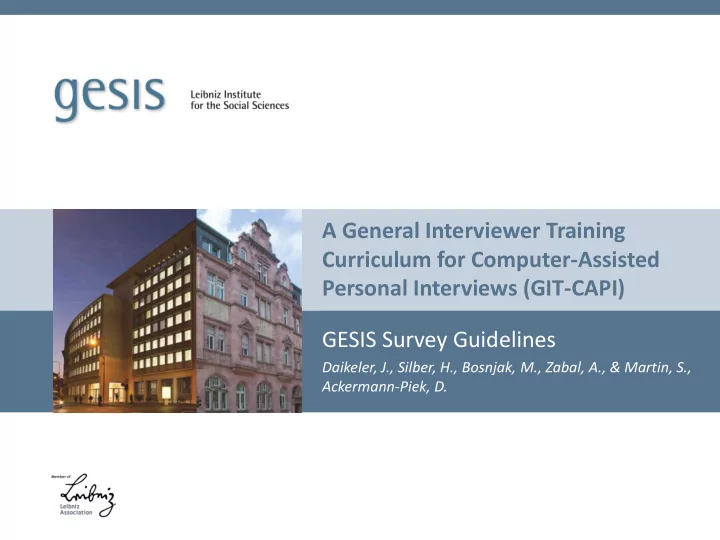

A General Interviewer Training Curriculum for Computer-Assisted Personal Interviews (GIT-CAPI) GESIS Survey Guidelines Daikeler, J., Silber, H., Bosnjak, M., Zabal, A., & Martin, S., Ackermann-Piek, D.
These slides are based on the GESIS Survey Guideline about a general interviewer training curriculum: Daikeler, J., Silber, H., Bosnjak, M., Zabal, A., & Martin, S. (2017). General interviewer training curriculum for Computer-Assisted Personal Interviews (GIT-CAPI; Version 1, 2017). GESIS Survey Guidelines. Mannheim, Germany: GESIS – Leibniz-Institute for the Social Sciences. doi:10.15465/gesis-sg_en_022 Please cite the slides as: Daikeler, J., Silber, H., Bosnjak, M., Zabal, A., & Martin, S. (2017). Slide Set: General interviewer training curriculum for Computer-Assisted Personal Interviews (GIT-CAPI; Version 1, 2017). GESIS Survey Guidelines. Mannheim, Germany: GESIS – Leibniz Institute for the Social Sciences.
Theoretical Background Interviewers … ... have many tasks during data collection (e.g. contact sample units, gain sample persons‘ cooperation, ask survey questions in neutral way, document contact attempts and complete interview) … are a potential source of multiple survey errors described in the Total Survey Error framework (Groves et al., 2009) Untrained interviewers produce data of lower quality in responses or lower cooperation rates (e.g. Billiet and Loosveldt 1988; Groves & McGonagle, 2001) Interviewers differ in their training and experience levels Possible solution: General Interviewer Training Curriculum for Computer-Assisted Personal Interviews (GIT-CAPI)
Theoretical background: Total Survey Error Measurement Representation Target Construct Population Validity Coverage Error Error Interviewer Sampling Measurement Frame Measurement Sampling Error Error Sample Response Processing Nonresponse Error Error Respondents Edited Adjustment Response Error Postsurvey Adjustments Survey Statistic Figure: Ackermann-Piek (under review), adapted from Groves et al. (2009)
Aim & Scope of the GIT-CAPI Curriculum for standardized interviewer trainings in Germany with flexible modules depending on interviewer experience and study-specific characteristics Target groups Survey organizations Survey projects University research projects
Modules of the GIT-CAPI: Overview Optional Module/s (at least one) Module 6: Professional Standards Module 7: and Ethics, Data Technical Tutorial Protection and Privacy (3 hours minimum) (3 hours minimum) Module 4: Module 5: Module 3: Survey Administration Interviewing Gaining Respondents’ and Survey Techniques and Cooperation Instruments Fieldwork (4 hours minimum) (4 hours minimum) (4 hour minimum) Module 1: Module 2: Procedural View on Quality Perspective on Surveys Surveys (5 hours minimum) (3 hours minimum) Prospective Interviewer Personnel Selection Module (not treated here)
Modules of the GIT-CAPI (4) Survey administration and survey (1) Procedural view on surveys instruments Purpose of surveys Administering interviews (study-specific) Role & tasks of interviewers Standardized (& unstandardized) survey (2) Quality perspective on surveys instruments Aspects of high-quality surveys & Question & response formats interviewers’ contributions to data quality Rules of asking questions & recording Quality management system of survey responses organizations (5) Interviewing techniques and fieldwork (3) Gaining respondents ’ cooperation Key interviewing skills Interviewer-respondent interaction Strategies for obtaining respondents’ cooperation (6) Professional standards and ethics, data protection and privacy Reasons for participation & refusals Professional standards Refusal avoidance techniques Ethical guidelines Refusal codes Legal principles of data protection & privacy (7) Technical tutorial CAPI technology/software (8) Survey-specific topics
References A complete list of all references used on these slides can be found in the above mentioned Survey Guideline paper. References not mentioned in the Survey Guideline Paper: Ackermann-Piek, D. (under review). Interviewer effects in PIAAC Germany 2012 .
Recommend
More recommend